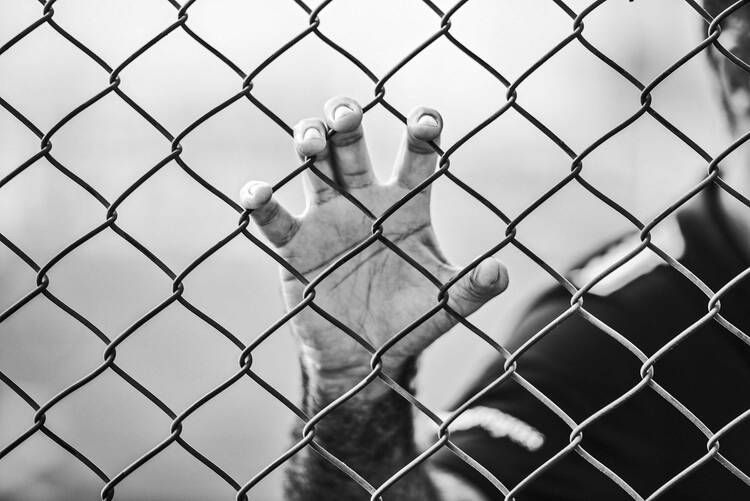When he pulls back from the table, it is wet from his tears. It isn’t like he is sobbing. The tears just fall silently.
Salvo, the name of this 30-something man who signed up for confession at the prison where I serve as a chaplain, kept on speaking. I wasn’t sure whether he was talking to God or to me. I just nodded. Moments earlier, my hands were placed over his, which were in handcuffs, before he held them in front of his face to pray, half in English, half in Spanish.
The two of us, he in his orange jumpsuit and me in my black clerical shirt and trousers, sat next to each other at one of the hexagonal metal tables in the middle of the cell block, visible to other inmates in the tiers above and below us. Some of them peered out of the small plastic windows on their cell doors. The guard who brought Salvo down from “the Hole” 15 minutes earlier, after shackling his hands and feet with chains, glanced up from his desk about 10 yards away from us as I placed my hands back on the table. I was aware of how intimate this praying looked. I didn’t mind. The tears said it all, to God if not to anyone else.
Today was a day of tears. Unusual for the men in prison, most of whom have to keep up a tough front. Often, they keep this stance with me too, even when in private, let alone when I meet them on the cell block instead of my office, as I have to meet those who are in protective custody. I believe if they can find one space to weep and be real with another person and before God, it will lead to their peace of mind and ability to be strong. I wait for them to pull themselves together before they go back to their cells.
I bow my head, feeling the calloused hands of a tough guy who would ordinarily never be resting his hands in another’s so vulnerably.
The whole dynamic of hearing confessions in prison is incredible. Quite a few guys have told me that they believe God got them into prison to save them from heading in the wrong direction. I use this awesome role of confessor to encourage them to foster this spark of God’s love for them, not to waste it. To ask for forgiveness from Jesus who came for this reason. And most of all, to be determined to continue this prayer relationship with God that they have discovered on the inside of the prison when they get outside.
Usually when I finish a visit with one of them, whether it is a formal confession or not, I say, “Do you want to pray?”
“Yes,” they invariably say, as though it is normal for two men to share their souls together.
I open my hands on the table between us, face up. As though they are children, they place their hands in mine. I have no idea what these hands may have done—robbed? Sold drugs? Abused someone? “Go ahead,” I say, waiting for them to start. “Oh no, you do it,” most respond.
“No, you do it,” I say. But I usually have to. They aren’t quite ready to launch out into this God territory with a virtual stranger, even one they amazingly trust because I am “Father” to them. I bow my head, feeling the calloused hands of a tough guy who would ordinarily never be resting his hands in another’s so vulnerably.
Quite a few guys have told me that they believe God got them into prison to save them from heading in the wrong direction. I use this awesome role of confessor to encourage them to foster this spark of God’s love for them, not to waste it.
After a few moments, I start with something like, “Oh God, bless this man. Help him to get out of here so he can be the Daddy his little girl needs. Help him to know your presence and care for him as a son. That you forgive him and want him to follow this path he is on now, not to waste this moment. Blow on that spark in his heart, Lord. Make it strong. Keep him safe here, and fill him with the love of Jesus Christ, please.” Then I wait.
If the inmate looks up, I motion for him to follow suit. “Go ahead,” I say. “Use your own words. God likes that.” An unworthy stare looks back at me. Really, Padre? Sometimes they do speak up though, usually simply from the heart in a way that must move God because it touches me even on the most difficult days. The spark is stirred.
I know I’ll come back to this place, back to these sons and daughters of God, to learn how to pray again, to learn how to be forgiven myself.
Now and then, an inmate will not look up. Rather, he will just leave his hands resting in mine. This can go on for a few minutes, resting in the touch of the God the Father’s love for him who is labeled a sinner. Then I close my eyes and do the same. It feels as though the earth’s violence dies down for a moment in this simple gesture: two men in prayer together while other men look on through plastic windows.
When Salvo stands to go, he places his manacled hands together in a gesture of prayer. He brushes the wetness off his cheeks and says, “Your visit good. It help. You come back?”
“Oh, I’ll come back,” I assure him. My glance drops to the puddle on the table. Humbled by his prayer, I know I’ll come back to this place, back to these sons and daughters of God, to learn how to pray again, to learn how to be forgiven myself.








